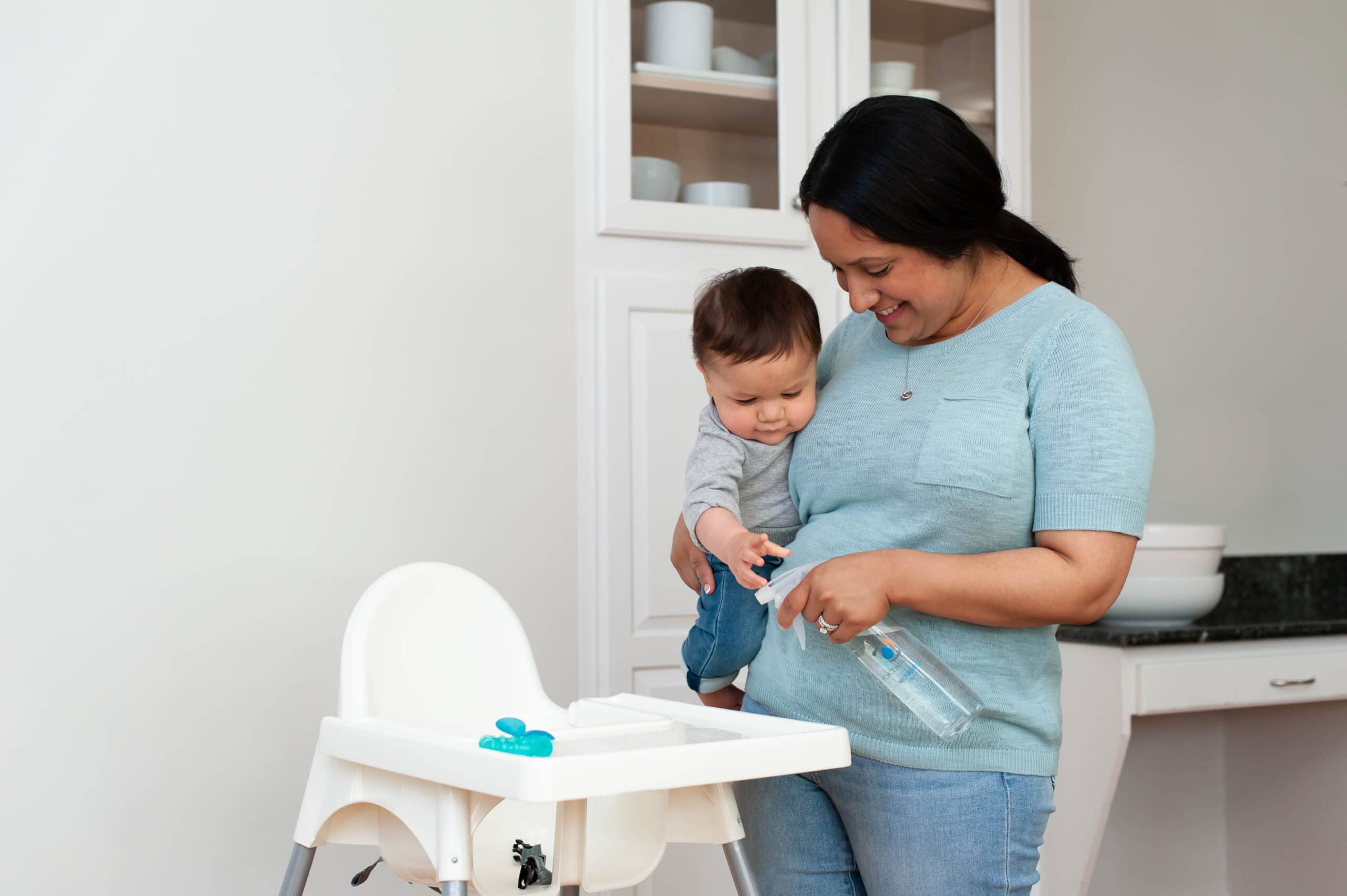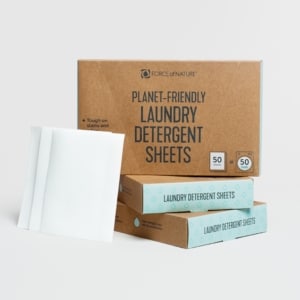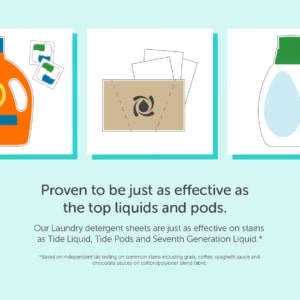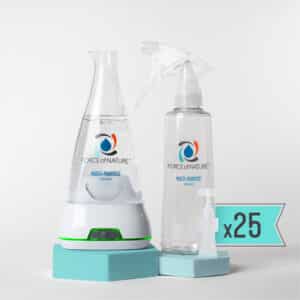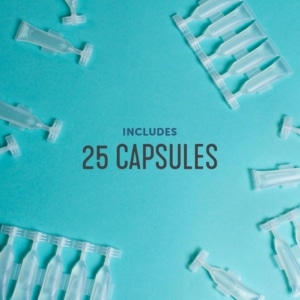After a deep clean, as you watch your munchkin crawl across the floor, you probably look around at your home feeling satisfied and ever-so-briefly calm – you’re keeping your family safe and healthy, after all! Sadly, the products you thought you were using to keep your family safe from germs may actually be putting them in harm’s way.
Here’s why. If you’re using traditional household cleaners frequently with infants and toddlers around, it could be putting them at an increased risk for health problems like asthma, wheezing, and allergies. Recent data from the CHILD Cohort Study show that babies, who spend up to 90% of their time indoors and are often in direct contact with household surfaces, are especially vulnerable to chemical exposure via the skin and lungs.
So, before you grab that disinfectant spray and go to town on the mess and grime that naturally comes along with having a little one, stop! Here’s why you should opt for non-toxic cleaning alternatives to keep your babies protected from germs and healthy without having to sacrifice that addictive “clean house” smell and satisfaction.
What We’ve Learned About Babies’ Health and Cleaning Chemicals
The first few months of babies’ lives are critical to the development of their respiratory and immune systems. They can be extra-sensitive to ingredients that you and I might think nothing of, so taking extra care when selecting the right cleaning products for homes where babies live is crucial. Fortunately, it’s a highly researched subject, so we’ve learned a lot about how exposure to household cleaners can impact little ones both immediately and as they grow up.
Asthma and Allergies
We have, by far, the most research on the link between cleaning chemicals and asthma in babies, and what researchers have found is pretty scary.
Childhood asthma has steadily become more prevalent over the past few decades, and today’s makes it clear that frequent exposure to cleaning chemicals in early life, especially within the first three months, is associated with an increased risk for asthma by age 3.
Another study found that kids with greater exposure to cleaning products were
35% more likely to develop chronic wheezing and chronic allergies than children with the least exposure. Babies’ delicate and growing respiratory and immune systems simply can’t handle the chemicals the way our adult bodies may be able to.
Clearly, some serious changes need to happen in the cleaning category! But it might not be enough to simply trade out traditional cleaning products with better-for-you options once the kiddos come along.
According to research, kids faced a 71% increased risk of asthma if their mom or dad worked a job that regularly involved handling cleaning agents, even if the parent quit the job years before conceiving. While it’s not necessarily direct causation, this startling data suggests that cleaning agents have a direct impact on the reproductive system.
Babies’ Vulnerability vs. Adults and Long-Term Effects
Toxic chemicals aren’t doing anyone any favors, but they can be especially harmful to babies, who are much more vulnerable to environmental toxins than adults.
What makes them so susceptible? The list is long.
- 1. While babies’ cells multiply and divide quickly and constantly, cell division markedly slows down in humans at older ages.
- 2. At birth, babies’ body systems, including their respiratory and immune systems, haven’t fully formed, so their growth can be impacted by environmental factors.
- 3. Babies breathe much more rapidly and take in more air than adults in proportion to body size.
- 4. Babies’ metabolism is higher and they eat and drink proportionately more than adults.
- 5. They have very different behavior patterns, including crawling and touching more household surfaces, and placing foreign objects in their mouth.
When you consider all of these factors it’s not totally surprising that in the United States, scientists estimate that 5% of childhood cancers and 30% of childhood asthma are linked to chemical exposure.
Even scarier: these impacts don’t always show up right away. Children can take years to develop symptoms and disorders triggered by early chemical exposure, and the risk to kids accumulates over time, so health effects may not be noticeable until it’s years (or even decades) later.
Cleaning Products to Avoid
The big takeaway from all of this research is that by identifying and eliminating exposure to toxic cleaning chemicals and finding healthier alternatives, you can keep your babies safe and reduce their risk of allergies, asthma, wheezing, and even cancer.
Want to know where to start? Consider that research showed that asthma risk was notably higher for kids in homes that often used air fresheners, dusting sprays, plug-in deodorizers, oven cleaners, and antimicrobial sanitizers. Trade these out if they’re one of your go-to’s, and swap them for natural alternatives.
Toxic-Free Cleaning Tips to Keep Your Babies Healthy
Parents know: babies are always touching and tasting things – especially things they’re not supposed to. It’s how they experience this brand new world, and they don’t quite understand the meaning of “no.” We know how much you want to keep the surfaces and items your little ones come into contact with safe, hygienic, and free from toxic chemicals – and we’re here to help!
Use these tips to keep your babies protected without sacrificing a clean home:
- 1. Use a toxic-free cleaning product that doesn’t include (or smell like) chemicals. Force of Nature starts with just salt, vinegar, and water, no scary chemicals needed. The appliance uses electricity to convert these 3 wholesome ingredients, along with your trusty tap water, into a super effective cleaner, deodorizer and disinfectant. It’s also certified 100% skin-safe and best for sensitive skin by SkinSAFE, Mayo Clinic’s allergy rating system. Plus, Force of Nature is an EPA-registered disinfectant that kills 99.9% of germs and is EPA-approved for use against SARS-CoV-2, the cause of COVID-19, so you can trust it to get the job done.
- 2. Skip antibacterial soap. In the long run, it may increase the risk of creating tougher, more resistant bacteria.
- 3. Minimize dirt before it comes in to lessen the cleaning load by having family members and guests take shoes off at the door.
- 4. If you need to refresh the smell of your home, open the windows. Make a deliciously fragrant simmer pot with your favorite fruit, spices, and herbs; if you want to diffuse essential oils, use them sparingly and talk to a pediatrician first, because natural fragrances can be as toxic as artificial fragrances.
Striking the Balance Between a Clean Home and Healthy Kids
Ah, parenting. There’s nothing quite as humbling as watching your little bundle of joy shove a newly discovered dust bunny straight into that cute little mouth! While you might get the immediate urge to break out the bleach and disinfecting chemicals, keep in mind the dangers associated with their frequent use for your little one.
The solution is finding a balance between a spotless home and a healthy environment. We’re proud to have created an all-in-1 cleaning system that contains no harmful chemicals, so you don’t have to sacrifice cleanliness while protecting your family from germs. The EPA has registered Force of Nature for sanitizing and disinfecting hospitals, ICUs, medical clinics, daycares, schools, restaurants & veterinary clinics & more, so it’s even trusted around those most sensitive to cleaning chemicals.
Say goodbye to the toxic cleaning chemicals of the past and “hello” to a better way to clean, sanitize and disinfect. Shop for your Force of Nature.
